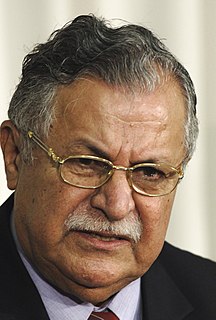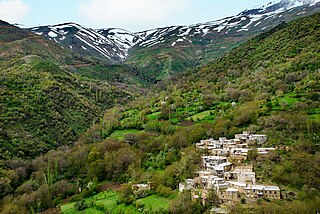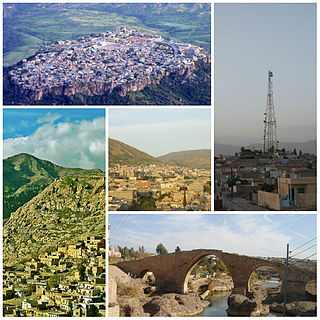
Kurds or Kurdish people are an Iranian ethnic group native to the mountainous region of Kurdistan in Western Asia, which spans southeastern Turkey, northwestern Iran, northern Iraq, and northern Syria. There are exclaves of Kurds in Central Anatolia, Khorasan, and the Caucasus, as well as significant Kurdish diaspora communities in the cities of western Turkey and Western Europe. The Kurdish population is estimated to be between 30 and 45 million.

The Patriotic Union of Kurdistan is a Kurdish nationalist political party in Iraqi Kurdistan. The PUK describes its goals as self-determination, human rights, democracy and peace for the Kurdish people of Kurdistan and Iraq. The PUK is currently under the co-leadership of presidents Lahur Talabany and Bafel Talabani. The PUK was founded in 1975 by Jalal Talabani, Nawshirwan Mustafa, Fuad Masum, Adel Murad, Ali Askari and Abdul Razaq Feyli.

Kurdistan is a roughly defined geo-cultural territory in Western Asia wherein the Kurdish people form a prominent majority population and the Kurdish culture, languages, and national identity have historically been based. Geographically, Kurdistan roughly encompasses the northwestern Zagros and the eastern Taurus mountain ranges.

Jalal Talabani was a Kurdish politician who served as the sixth President of Iraq from 2006 to 2014, as well as the President of the Governing Council of Iraq. He was the first non-Arab president of Iraq. He is known as Mam Jalal amongst the Kurds.

Kurdistan Province or Kordestan Province, is one of the 31 provinces of Iran. The province of Kurdistan is 28,817 km² in area. It is located in the west of Iran, in Region 3 and bound by Kurdistan Region of Iraq on the west, the province of West Azerbaijan to its north, Zanjan to the northeast, Hamedan to the east and Kermanshah to the south. The capital of Kurdistan Province is the city of Sanandaj. Other counties with their major cities are Saqqez, Baneh, Diwandarreh, Bijar, Qorveh, Dehgolan, Kamyaran, Sarvabad and Marivan.

Duhok Governorate is a governorate in the autonomous Kurdistan Region of Iraq. Its capital is the city of Duhok. It includes Zakho, near the Ibrahim Khalil border crossing with Şırnak Province, Turkey. It borders the Al-Hasakah Governorate of Syria. Before 1969, it was part of Nineveh Governorate, which was called Mosul Governorate. The estimated population in 2018 was 1,292,535.

Erbil Governorate, sometimes referred to by the alternative spelling Arbil Governorate, is a governorate of Iraq in Kurdistan Region. It is the capital and economic hub of the autonomous region of Kurdistan Region.
Iraqi Kurdistan or Southern Kurdistan refers to the Kurdish-populated part of northern Iraq. It is considered one of the four parts of Kurdistan, which also includes parts of southeastern Turkey, northern Syria, and northwestern Iran. Much of the geographical and cultural region of Iraqi Kurdistan is part of the Kurdistan Region (KRI), an autonomous region recognized by the Constitution of Iraq.

The Peshmerga, are the military forces of the autonomous Kurdistan Region of Iraq. Since the Iraqi Army is forbidden by Iraqi law to enter the Kurdistan Region, the Peshmerga, along with their security subsidiaries, are responsible for the security of Kurdistan Region. These subsidiaries include Asayish, Parastin u Zanyarî and the Zeravani (Gendarmerie). The Peshmerga predates Iraq, starting out as a strictly tribal pseudo-military border guard under the Ottomans and Safavids and later changing to a well-trained, disciplined guerrilla force in the 19th century.

The Kurdistan Regional Government (KRG) is the official executive body of the autonomous Kurdistan Region of northern Iraq.

The International School of Choueifat (ISC) is a collection of private international schools run by SABIS school system in various countries of the Middle East. The first International School of Choueifat was founded in Choueifat, Lebanon in 1886 and later expanded to various parts of the Persian Gulf region. The first Choueifat school in the Persian Gulf opened in Sharjah, United Arab Emirates in 1975 and subsequently others opened in other cities across the Middle East.

The Jews of Kurdistan are the Mizrahi Jewish communities native to the geographic region of Kurdistan, roughly covering parts of northwestern Iran, northern Iraq, northeastern Syria and southeastern Turkey. Kurdish Jews lived as closed ethnic communities until they were expelled from Arab and Muslim states from the 1940s–1950s onward. The community largely speaks Judeo-Aramaic and Kurdish languages, with the Kurmanji dialect of Iraqi Kurdistan being the most prevalent. As Kurdish Jews natively adhere to Judaism and originate from the Middle East, Mizrahi Hebrew is used for liturgy. Many Kurdish Jews, especially the ones who hail from Iraq, went through a Sephardic Jewish blending during the 18th century.

The Kurdistan Region is an autonomous region in Iraq comprising the four Kurdish-majority governorates of Dohuk, Erbil, Halabja and Sulaymaniyah and bordering Iran, Syria and Turkey. The Kurdistan Region encompasses most of Iraqi Kurdistan but excludes the disputed territories of Northern Iraq, contested between the Kurdistan Regional Government and the central Iraqi government in Baghdad since Kurdish autonomy was realized in 1992 in the aftermath of the Gulf War. The Kurdistan Region Parliament is situated in Erbil, but the constitution of the Kurdistan Region declares the disputed city of Kirkuk to be the capital of the Kurdistan Region. When the Iraqi Army withdrew from most of the disputed areas in mid-2014 because of the ISIL offensive in Northern Iraq, Kurdish Peshmerga entered the areas and held control there until Iraq retook the areas in October 2017.

Turkish Kurdistan or Northern Kurdistan refers to the southeastern part of Turkey, where Kurds form the predominant ethnic group. The Kurdish Institute of Paris estimates that there are 20 million Kurds living in Turkey, the majority of them in the southeast.

Masoud Barzani is a Kurdish politician who has been leader of the Kurdistan Democratic Party (KDP) since 1979, and was President of the Kurdistan Region of Iraq from 2005 to 2017. Barzani was born in the self-declared Republic of Mahabad, and succeeded his father Mustafa Barzani as leader of the KDP in 1979.

The Iraqi–Kurdish conflict consists of a series of wars and rebellions by the Kurds against the central authority of Iraq during the 20th century, which began shortly after the defeat of the Ottoman Empire in World War I and lasting until the U.S. invasion of Iraq in 2003. Some put the marking point of the conflict beginning to the attempt by Mahmud Barzanji to establish an independent Kingdom of Kurdistan, while others relate to the conflict as only the post-1961 insurrection by the Barzanis. The conflict lasted until the US invasion of Iraq in 2003, though tensions between the Kurdish autonomy and the central Iraqi government have continued.

Syrian Kurdistan is a Kurdish-inhabited area in northern Syria surrounding three noncontiguous enclaves along the Turkish and Iraqi borders: Afrin in the northwest, Kobani in the north, and Jazira in the northeast. Syrian Kurdistan is often called Western Kurdistan or Rojava, one of the four "Lesser Kurdistans" that comprise "Greater Kurdistan", alongside Iranian Kurdistan, Turkish Kurdistan, and Iraqi Kurdistan.
Iranian Kurdistan or Eastern Kurdistan is an unofficial name for the parts of northwestern Iran with either a majority or sizable population of Kurds. Geographically, it includes the West Azerbaijan Province, Kurdistan Province, Kermanshah Province, Ilam Province and parts of Hamadan Province and Lorestan Province.














